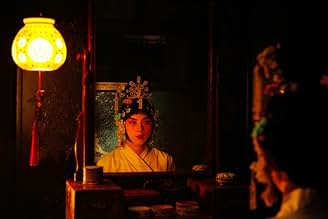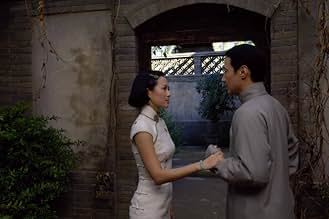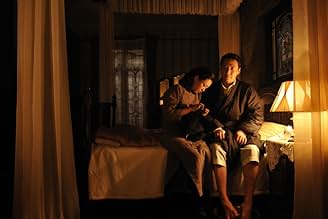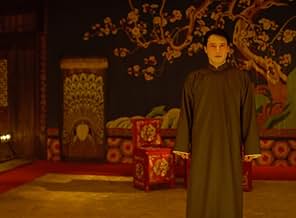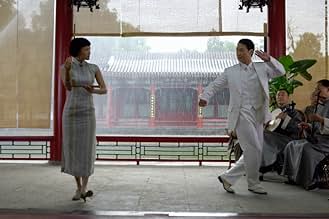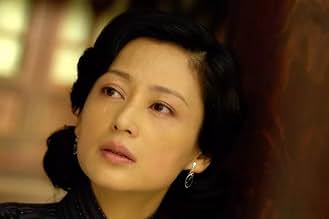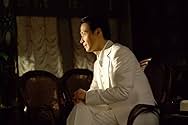Mei Lanfang
- 2008
- 2h 30m
IMDb RATING
6.7/10
1.7K
YOUR RATING
A biographical account of Mei Lanfang, China's greatest opera star.A biographical account of Mei Lanfang, China's greatest opera star.A biographical account of Mei Lanfang, China's greatest opera star.
- Awards
- 26 wins & 19 nominations total
- Director
- Writers
- All cast & crew
- Production, box office & more at IMDbPro
Featured reviews
I got to watch this trailer inadvertently when it was part of a montage sequence honouring Chen Kaige with the Akira Kurosawa Award during last year's Tokyo International Film Festival, and I was actually thrilled to have caught glimpses of it. I thought the boo-boys were out too early in lamenting Chen's choice of Leon Lai in the titular role, thinking that he would ruin what would be a decent biopic about one of China's greatest opera singer.
To me, those fears were quite unfounded, as I felt Leon Lai actually did reasonably well when under the thick operatic makeup to transform himself for his stage persona, from Mei Wanhua to Mei Lanfang, where portrays only female characters. But of course if put side by side with Chinese actor Yu Shaoqun, Lai paled considerably as Yu was obviously the better of the two, portraying the younger Mei who found his true calling when opportunity came knocking on his door, and deciding to seize it, yet being mindful all the time of where his roots were.
And the best parts were of course the first act, where Mei decides to up the ante and challenge his master, the then largest opera star Shi Sanyan (Wang Xueqi) to a show-down of sorts if you will. Under his master's wing, he finds himself somewhat stifled in not being able to explore his roles much further, given the master's fear that his thunder will be stolen. At the encouragement of maverick magistrate and future sworn brother / business manager Qiu Rubai (Sun Honglei), he finds some new found confidence to test waters while still keeping true to the core of his character, thus earning new praise, and given one's talent with nothing much to lose, one will go for broke - win and you win all, lose and you have really no reputation at stake, in contrary to his master.
It's about control, or the lack thereof. From early on we learn that actors in the days of the crumbling of the Chinese monarchy that they do not have any respect, and have to play to the whims of those with power, money and fame. Even then the child actors have to pander to lords with a penchant for young boys. Mei does not buckle his self-worth, and is pretty clear that while he portrays ladies in more feminine terms than real ladies, that it does not make him easy fodder. And we follow through his life how he does not get to live the life he wants to lead, but rather according to both the rules and regulations of the stage, as well as the same off it in society. Be it instructions from his managers, his wife Zhifang (Chen Hong) or the Japanese occupiers, each seemingly want to exert an influence over his career and personal life, not so much for personal gain, but to propagate that legend and persona so carefully crafted over the years.
Naturally Mei finds an avenue to fight back, and does so through an affair of the heart. While he portrays females on stage, he meets his equal in Meng Xiaodong (Zhang Ziyi), who is his mirror opposite, the best in the business in playing male characters. Together they blaze a trail of glory, and naturally leads to tongues wagging. While Zhang Ziyi may share top billing, in actual fact she's nothing more than a supporting role, coming in only in the middle portion to highlight Mei's need for escape from his rigid world.
Much is said about the supporting actors doing a far better job than the leads, and that is true, in a nice way. My respect for the Chinese actors have grown from watching a number of indie and mainstream films, and I can't credit the likes of Sun Honglei, Chen Hong, Wang Xueqi and especially Yu Shaoqun in being nothing less than superb each time they come on screen to chew up the scenery. It's not really fair to say the leads acted poorly, because the supporting cast had raised the bar in delivery, which adds to the enjoyment of the film.
I can never forget the really poor movie in The Promise which Chen Kaige made a couple of years back. The story was so bad it allowed the special effects to run wild in trying to salvage the show. There aren't a lot of Chinese bio-pics (or at least those I have watched) in recent years that were non-martial arts related (think Ip Man, Wong Fei-Hung, Fong Sai-Yuk, Huo Yuanjia etc), and somehow I'm glad Chen Kaige found his mojo back to helm this, and in far elegant terms that I'm now better convinced to check out more of his filmography. He was able to shift gears quite effortlessly between distinct acts of the narrative, which straddled a timeline from after the Qing Dynasty to after the surrender of the Japanese. However, there might seem to be a quantum leap in addressing issues towards the last 30 minutes, but for everything else, it was paced quite evenly to keep you interest from waning.
Forever Enthralled has all the ingredients of a credible epic, from beautiful set designs and art direction, to a wonderful soundtrack and elegant costumes, Chen Kaige does not scrimp in making this film look and feel just like it would back in those days of sheer opulence. While opera may be an artform that is dwindling here, don't let the Peking Opera focus here put you off, as you just might find some reason to want to watch the real thing if you have the opportunity to. Definitely recommended.
To me, those fears were quite unfounded, as I felt Leon Lai actually did reasonably well when under the thick operatic makeup to transform himself for his stage persona, from Mei Wanhua to Mei Lanfang, where portrays only female characters. But of course if put side by side with Chinese actor Yu Shaoqun, Lai paled considerably as Yu was obviously the better of the two, portraying the younger Mei who found his true calling when opportunity came knocking on his door, and deciding to seize it, yet being mindful all the time of where his roots were.
And the best parts were of course the first act, where Mei decides to up the ante and challenge his master, the then largest opera star Shi Sanyan (Wang Xueqi) to a show-down of sorts if you will. Under his master's wing, he finds himself somewhat stifled in not being able to explore his roles much further, given the master's fear that his thunder will be stolen. At the encouragement of maverick magistrate and future sworn brother / business manager Qiu Rubai (Sun Honglei), he finds some new found confidence to test waters while still keeping true to the core of his character, thus earning new praise, and given one's talent with nothing much to lose, one will go for broke - win and you win all, lose and you have really no reputation at stake, in contrary to his master.
It's about control, or the lack thereof. From early on we learn that actors in the days of the crumbling of the Chinese monarchy that they do not have any respect, and have to play to the whims of those with power, money and fame. Even then the child actors have to pander to lords with a penchant for young boys. Mei does not buckle his self-worth, and is pretty clear that while he portrays ladies in more feminine terms than real ladies, that it does not make him easy fodder. And we follow through his life how he does not get to live the life he wants to lead, but rather according to both the rules and regulations of the stage, as well as the same off it in society. Be it instructions from his managers, his wife Zhifang (Chen Hong) or the Japanese occupiers, each seemingly want to exert an influence over his career and personal life, not so much for personal gain, but to propagate that legend and persona so carefully crafted over the years.
Naturally Mei finds an avenue to fight back, and does so through an affair of the heart. While he portrays females on stage, he meets his equal in Meng Xiaodong (Zhang Ziyi), who is his mirror opposite, the best in the business in playing male characters. Together they blaze a trail of glory, and naturally leads to tongues wagging. While Zhang Ziyi may share top billing, in actual fact she's nothing more than a supporting role, coming in only in the middle portion to highlight Mei's need for escape from his rigid world.
Much is said about the supporting actors doing a far better job than the leads, and that is true, in a nice way. My respect for the Chinese actors have grown from watching a number of indie and mainstream films, and I can't credit the likes of Sun Honglei, Chen Hong, Wang Xueqi and especially Yu Shaoqun in being nothing less than superb each time they come on screen to chew up the scenery. It's not really fair to say the leads acted poorly, because the supporting cast had raised the bar in delivery, which adds to the enjoyment of the film.
I can never forget the really poor movie in The Promise which Chen Kaige made a couple of years back. The story was so bad it allowed the special effects to run wild in trying to salvage the show. There aren't a lot of Chinese bio-pics (or at least those I have watched) in recent years that were non-martial arts related (think Ip Man, Wong Fei-Hung, Fong Sai-Yuk, Huo Yuanjia etc), and somehow I'm glad Chen Kaige found his mojo back to helm this, and in far elegant terms that I'm now better convinced to check out more of his filmography. He was able to shift gears quite effortlessly between distinct acts of the narrative, which straddled a timeline from after the Qing Dynasty to after the surrender of the Japanese. However, there might seem to be a quantum leap in addressing issues towards the last 30 minutes, but for everything else, it was paced quite evenly to keep you interest from waning.
Forever Enthralled has all the ingredients of a credible epic, from beautiful set designs and art direction, to a wonderful soundtrack and elegant costumes, Chen Kaige does not scrimp in making this film look and feel just like it would back in those days of sheer opulence. While opera may be an artform that is dwindling here, don't let the Peking Opera focus here put you off, as you just might find some reason to want to watch the real thing if you have the opportunity to. Definitely recommended.
Accompanied by two girl mates, I went to watch Mei Lanfang. When "the end" showed on the screen, I found that both of them were crying. To be honest, I was a little bit confused at that moment--does it really worth the tear? Compared with Cheng Kaige's previous film "Wu Ji", "Mei Lanfang" is really a good movie, just good. It is not the first time for Cheng to make a film connected with Pecking opera. In 1993, his Golden Palm winning film" Ba Wang Bie Ji" really made the history. Althoug "Mei Lanfang" is a biographic film about the most famous Chinese Pecking opera actor, although it is more than 2 hours long, it failed to reach "Ba Wang Bie Ji"standard, just too slight.
Dear Director,
I can't help keeping comparing this movie with Farewell My Concubine, one of the best Chinese movies I have seen, which was also directed by you. Yes, having the same director, both tell us a story of Peking Opera singer(s), and both cover a turbulent era of certain decades during the twentieth century in China. I have to say, however, this one is disappointing, in many ways.
I have no doubt about your directing skills just by watching Farewell My Concubine. There, the roles were hysteria, and it's original, intensive, surprising, and thrilling. In Forever Enthralled, you tried to use the exactly same style, but unfortunately, it feels unnatural and overdone, as you were transfered from a brave pioneer to a boring follower of the previous yourself.
Like all types of arts, a real master piece can't be duplicated. Same as motion pictures. Farewell My Concubine is such a master piece that any mimicking trials afterwards, intentionally or not, turns out to fail, even though they are from the same director. There's nothing wrong to make another film of Peking Opera singers, but just don't use the same skill again and again.
Dear Screen Play Writers,
Did you realize the story is unbalanced? The first half of this film drags too long and the pace is way too slow, unnecessarily slow. I know you may want to emphasize Master Mei's earlier life experience that affected him so much, but the title of this film is not "The Teenager hood of Mei Lanfang".
Visiting the US actually was an important experience of Mei and also a great step to give him the opportunity to gain the international fame. However, your film made this part too weak. It's finished in such a hurry in the audiences' applause before I got a chance to focus on the singing of the leading actor. Is this a trick just because the actor couldn't perform the Opera well even though he is a pop singer? Check La Vie en Rose (2007) to see how a movie about a singer can make the singing magnificent.
Dear Ziyi Zhang,
I didn't see much improvement of your acting skills from Crouching Tiger Hidden Dragon. Not bad, but not good enough either. Yes I'm picky. But it has a long way to go before a actor/actress becomes a top one.
Dear Leon Lai,
Maybe they picked you for this role because you're a singer, but this role turned out to be too weak and too blurry. Maybe this is not your fault. They just didn't select the right person to act Master Mei. Imagine in the movie Dream Girls (2006): if Beyonce played Effie White, the situation would be insanely different.
Dear Honglei Sun,
I usually don't like those characters you played in the movie, but this one is an exception. Congratulations! You acted so well that I thought this movie should be called "The Story of Mei and His Brother Qiu". YOU ARE LITERALLY THE LEADING ACTOR. They didn't give enough chance to let Mei sing, but you got enough chance to act, and acted the best compared with others in this movie. In this movie, you were a super fan of Peking Opera and a super fan of Mei. You quit your staple teaching job and followed Mei to explore his career, felt happier about his every success than himself, worried him more than anybody else when he was in trouble, and helped him become a real master. Good job! Good for Brother Qiu, but not that good for this film, because this film is not supposed to only focus on Brother Qiu.
Dear Team,
Sorry, frankly speaking, this movie is not enthralled.
I can't help keeping comparing this movie with Farewell My Concubine, one of the best Chinese movies I have seen, which was also directed by you. Yes, having the same director, both tell us a story of Peking Opera singer(s), and both cover a turbulent era of certain decades during the twentieth century in China. I have to say, however, this one is disappointing, in many ways.
I have no doubt about your directing skills just by watching Farewell My Concubine. There, the roles were hysteria, and it's original, intensive, surprising, and thrilling. In Forever Enthralled, you tried to use the exactly same style, but unfortunately, it feels unnatural and overdone, as you were transfered from a brave pioneer to a boring follower of the previous yourself.
Like all types of arts, a real master piece can't be duplicated. Same as motion pictures. Farewell My Concubine is such a master piece that any mimicking trials afterwards, intentionally or not, turns out to fail, even though they are from the same director. There's nothing wrong to make another film of Peking Opera singers, but just don't use the same skill again and again.
Dear Screen Play Writers,
Did you realize the story is unbalanced? The first half of this film drags too long and the pace is way too slow, unnecessarily slow. I know you may want to emphasize Master Mei's earlier life experience that affected him so much, but the title of this film is not "The Teenager hood of Mei Lanfang".
Visiting the US actually was an important experience of Mei and also a great step to give him the opportunity to gain the international fame. However, your film made this part too weak. It's finished in such a hurry in the audiences' applause before I got a chance to focus on the singing of the leading actor. Is this a trick just because the actor couldn't perform the Opera well even though he is a pop singer? Check La Vie en Rose (2007) to see how a movie about a singer can make the singing magnificent.
Dear Ziyi Zhang,
I didn't see much improvement of your acting skills from Crouching Tiger Hidden Dragon. Not bad, but not good enough either. Yes I'm picky. But it has a long way to go before a actor/actress becomes a top one.
Dear Leon Lai,
Maybe they picked you for this role because you're a singer, but this role turned out to be too weak and too blurry. Maybe this is not your fault. They just didn't select the right person to act Master Mei. Imagine in the movie Dream Girls (2006): if Beyonce played Effie White, the situation would be insanely different.
Dear Honglei Sun,
I usually don't like those characters you played in the movie, but this one is an exception. Congratulations! You acted so well that I thought this movie should be called "The Story of Mei and His Brother Qiu". YOU ARE LITERALLY THE LEADING ACTOR. They didn't give enough chance to let Mei sing, but you got enough chance to act, and acted the best compared with others in this movie. In this movie, you were a super fan of Peking Opera and a super fan of Mei. You quit your staple teaching job and followed Mei to explore his career, felt happier about his every success than himself, worried him more than anybody else when he was in trouble, and helped him become a real master. Good job! Good for Brother Qiu, but not that good for this film, because this film is not supposed to only focus on Brother Qiu.
Dear Team,
Sorry, frankly speaking, this movie is not enthralled.
The choice of Zhang's cast is not at all convincing, she is too short and tiny to play an emperor on stage with Lai.
Chinese opera is a lot more demanding artistically and physically compared to the Western one as each cast small or big requires to sing, dance, let alone performing using expressions such as eyes and fingers, and the highly acrobatic moves. Unfortunately, we didn't see much acting of hers in Forever Enthralled.
The actor playing the young Mei is excellent though and odd to be praised though. For films like this perhaps they are better off sticking to proper Chinese opera actors and actresses.
Chinese opera is a lot more demanding artistically and physically compared to the Western one as each cast small or big requires to sing, dance, let alone performing using expressions such as eyes and fingers, and the highly acrobatic moves. Unfortunately, we didn't see much acting of hers in Forever Enthralled.
The actor playing the young Mei is excellent though and odd to be praised though. For films like this perhaps they are better off sticking to proper Chinese opera actors and actresses.
If you don't know anything about China and mei lanfang, I am sure that this movie is a little too hard to understand. After all, not every Chinese likes the Beijing opera. Just like many westerns are fascinated by the European royal families, many Asians don't really care about them at all. So it is the cultural thing.
Over all, this is a good movie, but it is a little too long. Of course, it is hard to tell a life story of a person for such a short time.
Shi Sanyan is really amazing. I felt as if he was indeed born in that time. It is also probably because I have never seen him on the screen before, so his performance was very fresh and authentic. Most of the supporting roles are very well performed. My mother thinks that the younger version of mei lanfang was better than the older version. The older version looks too stiff. I sort of agree with her.
I am writing this comment because there are only nine comments before me. After all, this is a good movie, it deserves for more comments.
Over all, this is a good movie, but it is a little too long. Of course, it is hard to tell a life story of a person for such a short time.
Shi Sanyan is really amazing. I felt as if he was indeed born in that time. It is also probably because I have never seen him on the screen before, so his performance was very fresh and authentic. Most of the supporting roles are very well performed. My mother thinks that the younger version of mei lanfang was better than the older version. The older version looks too stiff. I sort of agree with her.
I am writing this comment because there are only nine comments before me. After all, this is a good movie, it deserves for more comments.
Did you know
- TriviaMei was the first artist to spread Beijing Opera to foreign countries, participating in cultural exchanges with Japan, the United States, and other regions. He toured the world, forming friendships with the western contemporaries of his day, including Charlie Chaplin. In 1930 he toured North America, visiting Hollywood, where he was welcomed by Douglas Fairbanks and Mary Pickford. In 1935, Mei toured Europe, playing to appreciative audiences in Berlin and Moscow. Seeing Mei perform especially impressed the German playwright Bertold Brecht and influenced his concept of the alienation effect. He served as one of the mentors and guardians of the actress Li Yuru as she began her career
- SoundtracksNi Dong Wo De Ai
Performed by Ziyi Zhang, Leon Lai
Details
- Release date
- Countries of origin
- Official sites
- Language
- Also known as
- Forever Enthralled
- Filming locations
- Production companies
- See more company credits at IMDbPro
Box office
- Budget
- $15,000,000 (estimated)
- Gross worldwide
- $17,773,395
- Runtime
- 2h 30m(150 min)
- Color
- Sound mix
- Aspect ratio
- 2.35 : 1
Contribute to this page
Suggest an edit or add missing content




